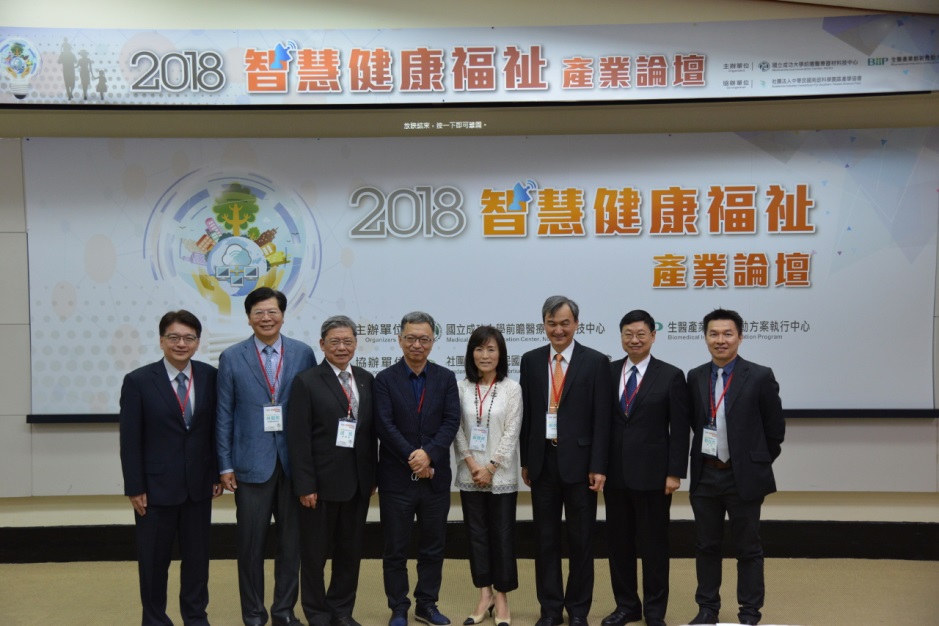Taiwan Turns Healthcare and Long-term Care to its Advantage in Creating a Brighter Future of Smart Health and Wellness
Jointly organized by the Biomedical Development Board (BDB) and the Medical Device Innovation Center of the National Cheng Kung University (NCKU) with the assistance of the Academia-Industry Consortium for Southern Taiwan Science Park

Jointly organized by the Biomedical Development Board (BDB) and the Medical Device Innovation Center of the National Cheng Kung University (NCKU) with the assistance of the Academia-Industry Consortium for Southern Taiwan Science Park, the “2018 Smart Health and Wellness Industry Forum” was held at NCKU on April 27. In response to the trend of global aging, this forum discussed important industrial development strategies and issues, such as “care and long-term care”, “cloud-based smart wards”, “smart medical devices”, “smart healthcare”, etc. These issues were fully discussed in the context of preventive medicine, smart elderly care and health promotion for the elderly. The event attracted over 200 audiences from various backgrounds to gear up for the upgraded “10-Year Long-term Care 2.0 Plan” in Taiwan.
Dr. Jui-Yuan Hsueh, Deputy Minister of the Ministry of Health and Welfare (MOHW), mentioned that the government’s “10-Year Long-term Care 2.0 Plan” is set to achieve the full implementation of long-term care. It aims to establish an excellent, affordable and universal long-term care system, which helps the elderly to age in place, provides family support and offers diversified and continuous care services in homes, communities and institutions.
In the Forum, Dr. Sheng-Che Lin, Vice Superintendent of Kuo General Hospital, introduced the smart medical care technology pertinent to the long-term care system. Dr. Lin pointed out the urgency of solving the problems of an ageing society by applying smart technology, such as cloud computing, big data and AI. Dr. Pin-Yen Liu, Director of the Cardiovascular Division of the Internal Medicine Department of the NCKU Medical Center, briefed on the smart medical devices for myocardial infarction currently used in the hospital. Tsz-Yin Chang, Director of the Industrial Economics and Knowledge Center cited the situations in Japan, the world’s most aged country, as an example to illustrate the future directions of the industrial development in Taiwan. Liang Cheng, President of the Family and Community Vision Society, introduced the concept of “Ageing Together and Ageing Better”. Dr. Li-Chieh Kuo, Director of the Medical Device Innovation Center of the NCKU, introduced various service platforms operated by the Center, featuring security, personalization and elderly-friendly interface.
Prof. Wentai Liu from the UCLA, known as the father of bionic eyes, shared his story of crossing over from electronic engineering to medical devices and leading to an ingenious invention of an artificial retina system which helps the blind to regain their eyesight. Prof. Liu also introduced his other researches and the commercialization process of some of his research results in the US. Chen-Hua Song, Director of the Quanta Computer R&D Center, introduced a medical information system which incorporates robots into manual operations so as to increase the care quality and reduce the operation costs. Yi-Sung Kuo, President of Comdek, emphasized the great importance for a product to stimulate the market demand in an ageing society by adding new values to smart home care. Sheng-Lung Hung, President of the Taiwan Medical and Biotech Industry Association, pointed out that the smart healthcare industry in Taiwan has been working hard to expand the market by developing new products which satisfy the imperative needs for healthcare and medical care. Allen Liu, General Manager of Taiwan Stipendiary, shared his experience in smart care technology and international marketing. He also briefed the audience on the high capacity of the service platform operated by his company.
Communication platform for biomedical innovation provides a new perspective on the industry strategic planning
Smart healthcare is one of the government’s administrative targets. It is estimated that, in 2061, the burden of caring for one elderly person is shared by 1.2 young/middle-aged adults in Taiwan. The MOHW’s data shows that only 20,000 out of the 110,000 trained carers stay with the care industry, causing a dire shortage of carers in Taiwan. To address the problems associated with an ageing population, many advanced countries have adopted inventive approaches, such as government sponsored carer training programs, smart medicine, smart care using wearable devices loaded with communication technology, as well as AI and robots developed from the combination of cloud computing, big data, machine learning, deep learning, etc. As an ageing society becomes a global reality, the government, industry and academia are eager to formulate a blue ocean strategy for an untapped market for the elderly.
Dr. Fong-Chin Su, Deputy Minister of the Ministry of Science and Technology and the CEO of the BDB, expressed that the government is currently engaged in the integration of the “medical care cloud” into the “health care cloud”, and has begun the journey to achieve industrial upgrade, talent exchange and system integration. These objectives can be accomplished through vertically integrating long-term care services, utilizing platform services and increasing demand. Looking into the future, the government is firmly committed itself to stimulating the elderly health and wellness industry, creating an industrial value chain, raising healthcare standards and, finally, leading into a prosperous future for the industry.